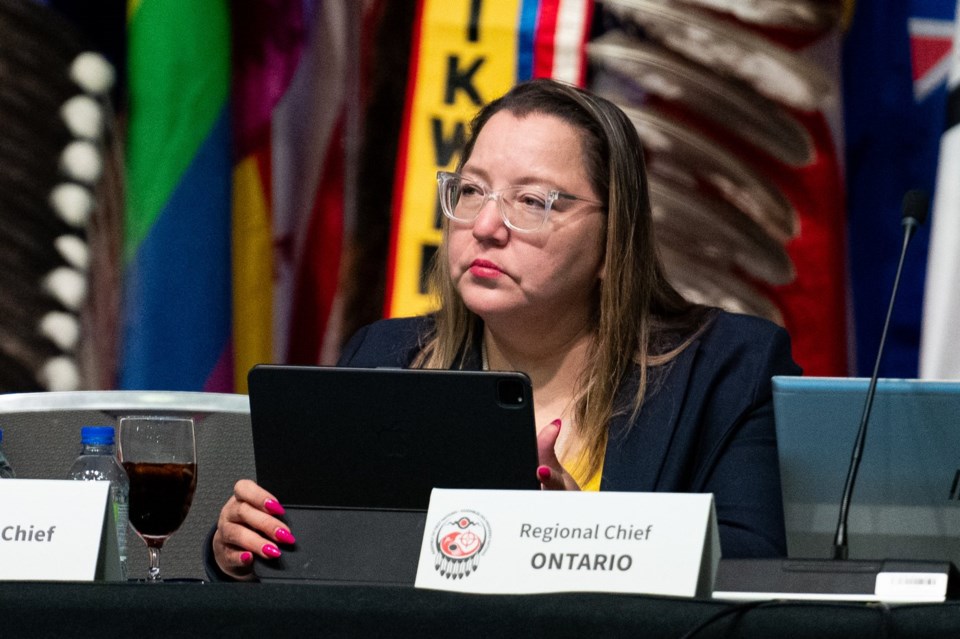OTTAWA — Three national Indigenous leaders say Indigenous Peoples should be at the centre of any discussions on how the country should respond to incoming U.S. president Donald Trump's threats on tariffs and Canada's territorial sovereignty.
National Chief Cindy Woodhouse Nepinak, Inuit Tapiriit Kanatami President Natan Obed and Métis National Council President Victoria Pruden made that pitch during a meeting with Prime Minister Justin Trudeau on Wednesday morning.
Trump has threatened to impose 25 per cent tariffs on all Canadian goods shipped to the U.S. on his first day back in office next week and has quipped Canada should become the 51st state.
Woodhouse Nepinak called Trump's rhetoric "outlandish" and "disrespectful" and said the territorial rights of Indigenous Peoples on both sides of the border are recognized by international law and predate the founding of both countries.
"First Nations lands hold the key to much of Canada's wealth, critical minerals and energy resources that are pivotal to domestic prosperity and trade with the United States," she told The Canadian Press on Thursday.
She said First Nations should be at the heart of any decisions the prime minister and premiers might make on economic development and trade.
After the meeting with Woodhouse Nepinak, Obed and Pruden, Trudeau met with premiers from each province and territory to debate strategies to deal with Trump's threats.
Woodhouse Nepinak said that while she welcomed the private meeting with the prime minister to discuss cross-border mobility for First Nations peoples and other areas of concern, First Nations leaders should also have been at the table for the meeting with the premiers.
"It's unfortunate," she said.
"There's been lots of statements made from the president-elect towards our country, and I think one thing's clear: we all have to stand together and be strong, but work together and make sure that we're building relationships here in this country."
In a statement issued Thursday, Matawa First Nations, an advocacy body representing eight First Nations in Ontario, questioned comments by Ontario Premier Doug Ford on critical mineral supplies.
The Ontario government floated the idea of an "Am-Can Critical Mineral Security Alliance" on Thursday that would build out critical mineral supply chains — resources found in Matawa territory.
"Ontario public interest and reconciliation requires progressive leadership at the premier and ministerial levels. As such, the (Matawa Chiefs Council) urges caution to the Ontario public relying on one-sided views held by the Ontario government related to the rights and interests of the Matawa region," the group wrote.
"The Matawa Chiefs Council call on the premier of Ontario to reconsider the colonial approach underway and meet with us collectively as a matter of priority."
Woodhouse Nepinak said the premiers need to recognize that First Nations "can't be left to the sidelines anymore."
"When we go to court, we win," she added. "We've won over and over again in the provinces."
The Métis National Council, comprised of the Métis Nation of Ontario and the Métis Nation of Alberta after the departure of three other regions, took part in Wednesday's meeting with Trudeau.
The Manitoba Métis Federation, which represents descendants of the Red River Métis, did not participate in the meeting.
An unsigned statement released after the meeting says the Métis National Council stressed that tariffs and retaliatory measures will negatively affect Métis peoples and businesses, Indigenous economies and the supply chain at large.
"Together, we must stand united to protect the livelihoods of Indigenous peoples and ensure the strength of the world’s most successful economic relationship," it reads.
"The Prime Minister acknowledged the important role the Métis National Council plays in these efforts, calling on us to support Team Canada’s approach for the betterment of all Canadians and the Métis Nation."
This report by The Canadian Press was first published Jan. 16, 2025.
Alessia Passafiume, The Canadian Press



